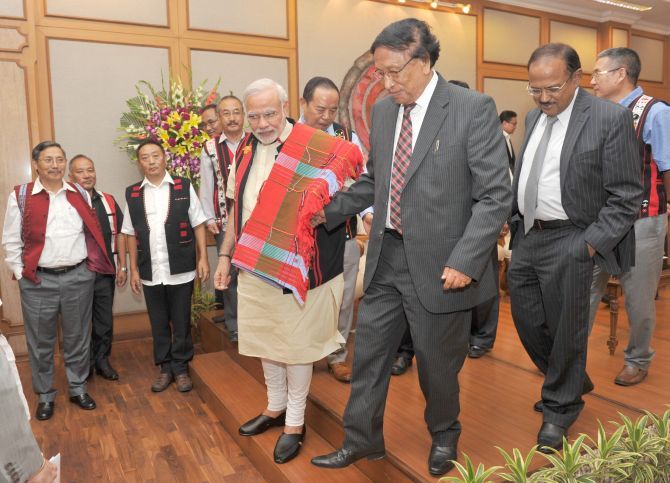'According to top government sources, the territorial boundaries of the existing North-Eastern states will not be disturbed although cultural integration of Nagas living in states other than Nagaland will be facilitated through special measures,' reveals Nitin A Gokhale.

When Ravindra Narayan Ravi, a former Special Director of the Intelligence Bureau, was made the interlocutor for the Naga talks by Prime Minister Narendra Modi in August last year, the mandate given to him was clear: Bring the Nagas around with honour and dignity.
The reasoning was simple. If India's 'Act East' policy has to succeed, the North-Eastern states needed lasting peace. And the key to sustained peace was identified as a settlement of the Naga problem, lingering on for over half a century.
In less than a year after he was appointed, Ravi has delivered an accord that speaks about a 'life of dignity, opportunity and equity for the Naga people, based on their genius and consistent with the uniqueness of the Naga people and their culture and traditions.'
For decades, the Nagas have demanded respect and dignity from the Indian State and recognition of their unique status as a people. This framework pact -- the details will be known in a month's time -- was signed in a spirit of 'equitable agreement.'
According to a note issued by the Press Information Bureau, under the accord, 'The Government of India recognised the unique history, culture and position of the Nagas and their sentiments and aspirations. The NSCN understood and appreciated the Indian political system and governance.'
In other words, while the Indian government agreed to recognise the 'uniqueness' of the Nagas, the Naga leaders also accepted the Indian Constitution.
The adherence to the Indian Constitution means the tricky issues of sovereignty and integration of all Naga-majority areas (or Greater Nagaland as it was termed by the NSCN) in the region is no longer on the front burner. This will come as a major relief for the state governments in Manipur, Assam and Arunachal Pradesh.
According to top government sources, the territorial boundaries of the existing North-Eastern states will not be disturbed although cultural integration of Nagas living in states other than Nagaland will be facilitated through special measures.
For instance, more financial and administrative autonomy for Naga-inhabited areas in neighbouring states could be discussed and implemented.
The resolution of other contentious issues like disarming of the NSCN (IM) cadres, winding up of the designated camps and the status and position of the NSCN leaders, will be keenly watched.
For the two top leaders of the NSCN (IM) -- Issac Chisi Swu and Thuingaleng Muivah -- the accord marks a culmination of five decades of struggle against an unyielding Indian State. Swu, ailing and frail, could not attend the signing ceremony, but his closest friend and confidante, Muivah would be happy that the pact has been signed during their lifetime. Both have been underground leaders since the mid-1960s.
V S Atem, another senior NSCN leader, told the Nagaland Post that the NSCN (IM) has made a 'historic agreement' of reconciliation and unity on the basis of political and historical right of the Nagas. He maintained that both the Shillong Accord of 1975 and the 16 point agreement of 1960 were not made on the basis of the political and historical right of the Nagas.
Prime Minister Narendra Modi also indirectly acknowledged that mistakes were made in the past. 'Today, we mark not merely the end of a problem but the beginning of a new future. We will not only try to heal wounds and resolve problems but also be your partner as you restore your pride and prestige,' Modi said, paying compliments to the Naga people at large and to the 'wisdom' of the NSCN leaders who honoured the 1997 peace pact for almost two decades.
Sceptics will, of course, argue that past pacts with one faction of the Nagas -- in 1975, Muivah and Swu had refused to accept an accord signed by other leaders -- have not worked and a rival faction, the NSCN (K), so named because it is led by S S Khaplang, a Burmese Naga, may still play spoilsport by intensifying violence in the North-Eastern states.
But the government is confident of neutralising the NSCN (K), which has of late indulged in several ambushes. The details will emerge in the next few weeks, but for the moment, those who worked long and hard to achieve this major breakthrough, need to be complimented for their sagacity, wisdom and acceptance of reality.
Nitin A Gokhale is one of India's leading commentators on national security issues.
REDIFF RECOMMENDS
IMAGE: Prime Minister Narendra Modi with Nationalist Socialist Council of Nagaland leader Thuingaleng Muivah. National Security Advisor Ajit Doval and other NSCN leaders are also seen. Photograph: Press Information Bureau











 © 2025
© 2025